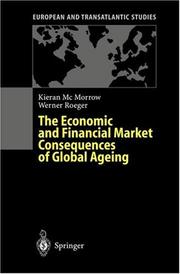| Listing 1 - 3 of 3 |
Sort by
|

Abstract | Keywords | Export | Availability | Bookmark
 Loading...
Loading...Choose an application
- Reference Manager
- EndNote
- RefWorks (Direct export to RefWorks)
Age distribution (Demography) --- Aging --- Cohort analysis --- Economic forecasting --- Employment forecasting --- Finance --- Saving and investment --- Economic aspects --- Economic aspects --- Forecasting --- Forecasting
Book
Year: 2019 Publisher: Washington, D.C. : The World Bank,
Abstract | Keywords | Export | Availability | Bookmark
 Loading...
Loading...Choose an application
- Reference Manager
- EndNote
- RefWorks (Direct export to RefWorks)
The main goal of this paper is to document and analyze the long-term evolution of inequality of opportunity and thus extend the recent empirical literature, which is mainly concerned with its measurement at a specific point in time. Using repeated cross-section surveys for five European countries (France, Germany, Great Britain, Italy, and Switzerland), the evolution of inequality of opportunity is measured for a period of about two decades for the whole populations, as well as for different birth cohorts. Relative inequality of opportunity represents an important portion of total income inequality, with values ranging from 30 to 50 percent according to the standard deviation of logs (and reaching a lower share in case of mean log deviation) and, for all the countries, it shows a stable or declining time trend. When the birth cohorts are followed across time, inequality of opportunity decreases with age: the effect of circumstances seems to weaken over the life cycle. This is a quite different age profile from that of inequality of outcomes (income or consumption), which generally increases with age. A decomposition of the relative inequality of opportunity allows highlighting some key drivers of its time evolution. In all the countries, there has been a clear enhancement of equality of educational opportunity (as captured by a downward trending intergenerational education persistence) and a reduction of the returns to education. However, for some countries, notably Italy, these trends have failed to translate into decreasing inequality of opportunity in the income distribution because of the increasing role of parental networking (an additional channel through which parental background affects the incomes of offspring).
Cohort analysis --- Decomposition methods --- Education mobility --- Educational sciences --- Family networking --- Gender --- Gender and development --- Inequality of opportunity --- Labor markets --- Returns to education --- Rural development --- Rural labor markets --- Social protections and labor --- Tertiary education
Book
Year: 2018 Publisher: Washington, D.C. : The World Bank,
Abstract | Keywords | Export | Availability | Bookmark
 Loading...
Loading...Choose an application
- Reference Manager
- EndNote
- RefWorks (Direct export to RefWorks)
This paper compares the intergenerational mobility of educational and occupational attainment of men from disadvantaged groups (Scheduled Castes (SC) and Scheduled Tribes (ST)) in India with the intergenerational mobility of men outside these groups during 1983-2009. Although there has been a modest convergence in mobility rates of non-SC/ST and SC/ST men in educational attainment, there has been no significant convergence in the mobility rates of occupational attainment. Upward mobility of SC/ST men remains much lower compared to non-SC/ST men. Additionally, the former are more susceptible than the latter to moving down the intergenerational ladder. The mobility gap varies over a large range across states, but the cross-state variation has declined, with convergence being higher in states with larger gaps initially. The paper finds no evidence of higher convergence in states with higher economic growth. As such, policies that focus on growth may not necessarily deliver convergence in outcomes across social groups.
Castes --- Cohort Analysis --- Convergence --- Economic Growth --- Economic Theory & Research --- Education --- Educational Sciences --- Industrial Economics --- Industry --- Intergenerational Mobility --- Labor Markets --- Macroeconomics and Economic Growth --- Mobility --- Primary Education --- Skills Development and Labor Force Training --- Social Protections and Labor --- Youth Employment
| Listing 1 - 3 of 3 |
Sort by
|

 Search
Search Feedback
Feedback About
About Help
Help News
News